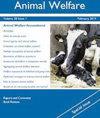Linking the roles of personality and stress physiology for managing the welfare of captive big cats
IF 2.3
4区 农林科学
Q2 VETERINARY SCIENCES
引用次数: 1
Abstract
Animal welfare is important for the humane treatment of animals under our care. Zoos and rescue centres manage various charismatic animals, such as big cats, with limited resources. It is therefore essential for caretakers to understand the needs of an individual big cat to ensure its welfare. However, these needs may differ due to a big cat's personality, which may be identified by its coping style in a stressful situation. In addition, stress is one of the major factors affecting animal welfare. There is limited evidence showing strong associations between personality and stress physiology in big cats. This review focuses on the integration of personality and stress physiology of captive big cats, to highlight possible improvements in their husbandry. Our review identifies key factors that may influence big cat responses to stressors. These influencing factors include: i) social interactions; ii) environment; iii) life history and evolutionary traits; iv) genetics; and v) health. The first two factors are relatively well covered in the literature; however, the final three are potentially very promising avenues for future research to better understand how we can improve big cat welfare.将个性和压力生理学的作用联系起来,以管理圈养大型猫科动物的福利
动物福利对于人道对待我们所照顾的动物是很重要的。动物园和救援中心用有限的资源管理着各种有魅力的动物,比如大型猫科动物。因此,对于饲养员来说,了解每只大型猫科动物的需求以确保其福利是至关重要的。然而,这些需求可能会因大型猫科动物的个性而有所不同,这可能会通过它们在压力情况下的应对方式来确定。此外,应激是影响动物福利的主要因素之一。有有限的证据表明,大型猫科动物的个性和压力生理之间存在强烈的联系。本文对圈养大型猫科动物的个性与应激生理的整合进行了综述,以突出其饲养方面可能存在的改进。我们的综述确定了可能影响大型猫科动物对压力源反应的关键因素。这些影响因素包括:1)社会互动;(二)环境;Iii)生活史和进化特征;(四)基因;5)健康。前两个因素在文献中涉及得相对较好;然而,最后三个可能是未来研究中非常有前途的途径,可以更好地了解我们如何改善大型猫科动物的福利。
本文章由计算机程序翻译,如有差异,请以英文原文为准。
求助全文
约1分钟内获得全文
求助全文
来源期刊

Animal Welfare
农林科学-动物学
CiteScore
2.30
自引率
8.30%
发文量
43
审稿时长
18-36 weeks
期刊介绍:
Animal Welfare is an international scientific and technical journal. It publishes the results of peer-reviewed scientific research, technical studies and reviews relating to the welfare of kept animals (eg on farms, in laboratories, zoos and as companions) and of those in the wild whose welfare is compromised by human activities. Papers on related ethical, social, and legal issues and interdisciplinary papers will also be considered for publication. Studies that are derivative or which replicate existing publications will only be considered if they are adequately justified.
Papers will only be considered if they bring new knowledge (for research papers), new perspectives (for reviews) or develop new techniques. Papers must have the potential to improve animal welfare, and the way in which they achieve this, or are likely to do so, must be clearly specified in the section on Animal welfare implications.
 求助内容:
求助内容: 应助结果提醒方式:
应助结果提醒方式:


